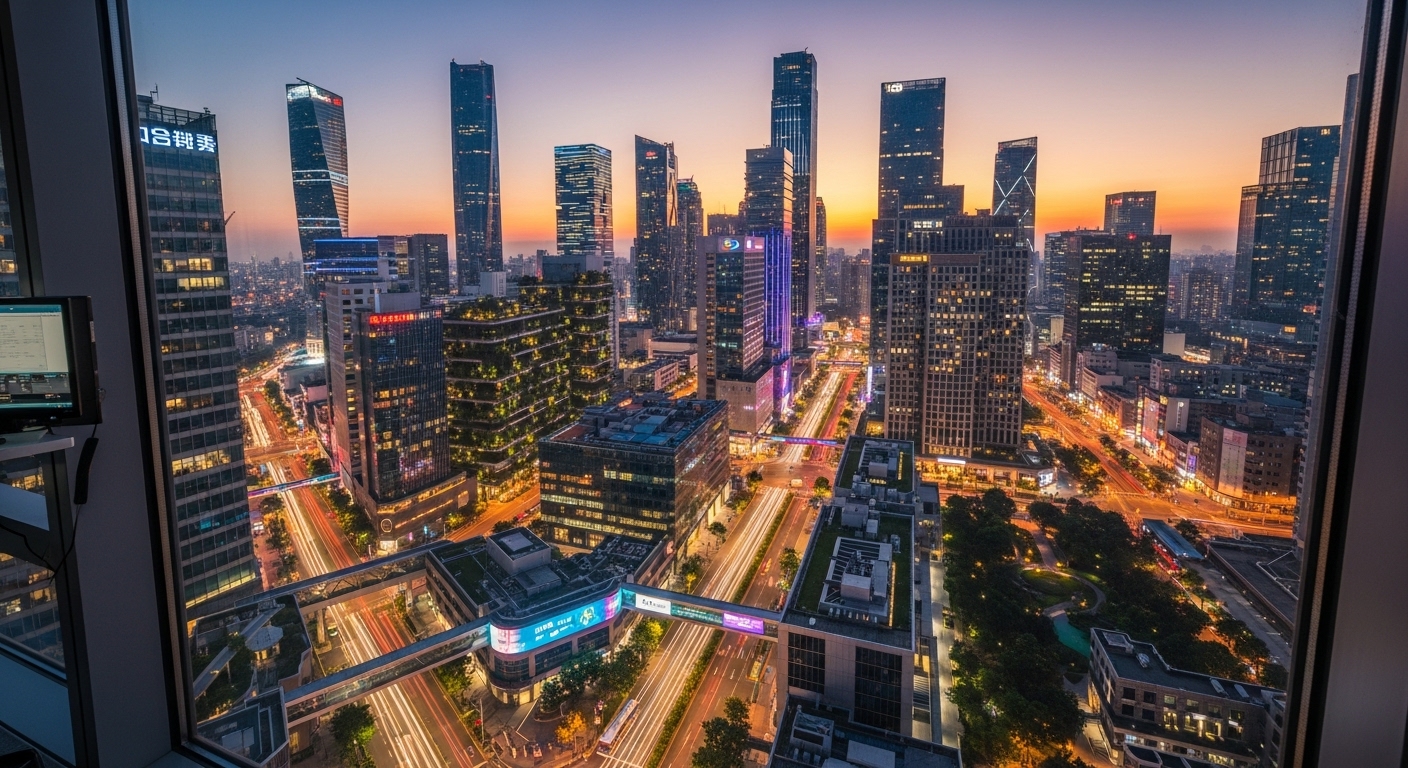For decades, conversations about Asia-Pacific business were dominated by a few titans: Tokyo, Hong Kong, and Singapore. These cities stood as unshakable pillars of global finance and trade. However, a profound transformation is underway. Driven by unprecedented digital acceleration, strategic supply chain diversification, and a demographic dividend of young, tech-savvy talent, a new class of cities is rising from the landscape. These emerging powerhouses are not just following the old playbook; they are writing new chapters of innovation and growth. This shift, which we call the ‘Phoenix Effect,’ represents one of the most significant economic realignments of our time. This article will take you beyond the established giants to explore the dynamic ecosystems of APAC’s next-generation hubs. We will journey through the tech corridors of Bangalore, the bustling streets of Ho Chi Minh City, the digital archipelago of Jakarta, and other dynamic locales, uncovering the unique opportunities they offer for forward-thinking businesses ready to embrace the future of global commerce.
The Macro-Shift: Why New Hubs Are Gaining Momentum
The rise of new economic centers in the Asia-Pacific region is not a random occurrence but the result of powerful converging forces. The most prominent driver is the strategic diversification of supply chains, often termed the “China Plus One” strategy. As global companies seek to build resilience and mitigate geopolitical risks, they are actively looking for alternative manufacturing and operational bases. Nations like Vietnam and Indonesia have become prime beneficiaries, offering competitive labor costs, improving infrastructure, and favorable government policies. Secondly, the demographic landscape of APAC is a massive advantage. While Western nations and even some established Asian economies face aging populations, countries like India, Indonesia, and the Philippines boast a vast, young, and increasingly educated workforce. This ‘demographic dividend’ fuels both a robust consumer market and a deep talent pool for innovation. Finally, the hyper-acceleration of digitalization is leveling the playing field. With widespread mobile adoption and a burgeoning digital economy, cities like Jakarta and Bangalore have become fertile ground for fintech, e-commerce, and SaaS startups, attracting billions in venture capital. As a recent report from the Asian Development Bank noted, “Digital transformation is no longer a choice but a necessity for economic survival and prosperity in post-pandemic Asia.” This digital leapfrogging allows emerging hubs to bypass legacy systems and build modern, efficient economic engines from the ground up.
Bangalore, India: The Uncontested Silicon Valley of the East
While often mentioned alongside established tech hubs, Bangalore’s continuous and explosive evolution keeps it firmly in the ’emerging powerhouse’ category. It has transcended its origins as an IT outsourcing center to become a global R&D and deep-tech nucleus. The city’s strength lies in its unparalleled concentration of high-skilled engineering talent, nurtured by prestigious institutions and a culture of technical excellence. This has attracted nearly every major global tech company—from Google to Amazon to Apple—to establish significant research and development centers here. The ecosystem is further supercharged by a vibrant startup culture and a torrent of venture capital funding. In recent years, Bangalore has consistently ranked among the top cities globally for VC investment in tech. The city is a world leader in fields like enterprise software, AI development, and biotech research. It’s home to the highest number of startups in India, including a significant portion of the country’s unicorns.
As Nandan Nilekani, co-founder of Infosys, once stated, “The true power of Bangalore is its ability to create a virtuous cycle of talent, capital, and ideas that constantly reinvents itself.”
This self-perpetuating cycle of innovation makes Bangalore more than just a city; it’s a living laboratory for the future of technology, offering businesses access to world-class talent and a front-row seat to the next wave of digital disruption.
Ho Chi Minh City, Vietnam: The Manufacturing and Startup Dynamo
Ho Chi Minh City (HCMC) is the vibrant, beating heart of Vietnam’s economic miracle. For years, it has been a magnet for foreign direct investment (FDI) in manufacturing, particularly in textiles, electronics, and furniture, as companies seek cost-effective and stable alternatives. The city’s strategic location, with its network of ports and industrial parks, makes it a critical node in global supply chains. However, to label HCMC as merely a manufacturing hub would be to miss the bigger story. A powerful undercurrent of technological innovation is transforming its economic identity. Fueled by a young, ambitious, and digitally native population of nearly 9 million, HCMC has cultivated a thriving startup ecosystem. The city is buzzing with activity in fintech, e-commerce, and logistics tech, with local champions like VNG Corporation (often dubbed Vietnam’s first unicorn) paving the way. Government support has been instrumental, with initiatives like Saigon Hi-Tech Park providing crucial infrastructure and incentives for tech companies. This dual identity—as both a manufacturing powerhouse and a burgeoning tech hub—gives HCMC a unique resilience and a multi-faceted value proposition for international businesses looking for both production efficiency and market growth.
Jakarta, Indonesia: Epicenter of a Digital Nation
To understand the potential of Jakarta, one must first grasp the scale of Indonesia. As the world’s fourth most populous country with over 270 million people, its domestic market is colossal. Jakarta stands at the epicenter of this vast archipelago’s digital revolution. The city is home to a staggering concentration of tech unicorns that have become household names across Southeast Asia, including super-app GoTo (formed from the merger of Gojek and Tokopedia) and e-commerce giant Bukalapak. These companies are not just tech platforms; they are fundamental infrastructure for the modern Indonesian economy, covering everything from ride-hailing and food delivery to digital payments and online retail. This rapid digital adoption is driven by a massive, young consumer base that has largely leapfrogged desktop computing and moved straight to mobile. The Indonesian government is also investing heavily in improving the business climate and digital infrastructure to attract more foreign capital. For global companies, Jakarta offers a gateway to one of the largest and fastest-growing consumer markets on the planet. While navigating the city’s infamous traffic and bureaucracy can be challenging, the opportunity to tap into a digitally-engaged population of hundreds of millions is an economic prize that few other emerging hubs can match.
Kuala Lumpur, Malaysia: The Strategic and Cost-Effective Hub
Often flying under the radar compared to its high-profile neighbors, Kuala Lumpur (KL) presents a compelling and balanced value proposition. It has quietly positioned itself as a highly strategic, cost-effective, and well-connected hub for businesses looking to serve the broader Southeast Asian market. One of KL’s primary advantages is its sophisticated infrastructure, including world-class airports, reliable digital connectivity, and modern office spaces, all available at a fraction of the cost of Singapore or Hong Kong. This makes it an ideal location for regional headquarters, shared services centers, and back-office operations. Furthermore, Malaysia’s multicultural and multilingual talent pool—with widespread proficiency in English, Mandarin, and Malay—is a significant asset for companies managing diverse regional teams. The Malaysian government has actively courted foreign investment through agencies like the Malaysia Digital Economy Corporation (MDEC), which offers incentives and support for tech companies. The city has a growing specialization in Islamic finance, fintech, and data analytics centers. For businesses that need a stable, affordable, and strategically located base with access to skilled talent, Kuala Lumpur offers a pragmatic and powerful solution that balances operational efficiency with significant growth potential.
Seoul, South Korea: The Deep Tech and Cultural Innovation Capital
While South Korea is an established economic giant, its capital, Seoul, is continually re-emerging as a powerhouse in new, cutting-edge sectors. Moving beyond its legacy in consumer electronics and heavy industry, Seoul is now at the global forefront of ‘deep tech’—fundamental technological breakthroughs in areas like artificial intelligence, robotics, biotechnology, and next-generation telecommunications (6G). Supported by massive R&D investments from conglomerates (chaebols) like Samsung and SK Hynix, and a government fiercely dedicated to securing technological sovereignty, the city fosters an environment of relentless innovation. The Pangyo Techno Valley, often called Korea’s Silicon Valley, is a concentrated ecosystem of over a thousand tech companies working on these future-defining technologies. But Seoul’s influence isn’t limited to technology. It has also become a global cultural capital, with the international success of K-pop, K-drama, and Korean cinema (the ‘Hallyu’ or Korean Wave) creating immense soft power and driving consumer trends worldwide. This unique fusion of deep technological prowess and global cultural influence makes Seoul an incredibly dynamic hub for businesses in creative industries, media, and consumer-facing tech, offering a direct line to the trends that will shape the future.
Conclusion: Embracing the Next Frontier of Growth
The economic gravity in the Asia-Pacific is undeniably shifting. While the established hubs of Singapore, Hong Kong, and Tokyo will remain vital financial and logistical centers, the narrative of growth is now being written in the bustling tech parks of Bangalore, the dynamic factory floors of Ho Chi Minh City, and the digital marketplaces of Jakarta. These emerging powerhouses, and others like them, represent the next frontier of global commerce. They offer a potent combination of demographic vitality, technological ambition, and strategic importance that is impossible for forward-looking organizations to ignore. The Phoenix Effect is a testament to the region’s resilience and adaptability, demonstrating a powerful ability to build new centers of excellence and innovation. For businesses, successfully navigating this new landscape requires a move beyond traditional strategies. It demands a deeper understanding of local cultures, a willingness to build local partnerships, and an agility to adapt to rapidly changing markets. The question is no longer *if* these cities will become global economic leaders, but *how* quickly. The companies that recognize this shift and invest in understanding these dynamic ecosystems today will be the ones that capture the immense growth opportunities of tomorrow.





